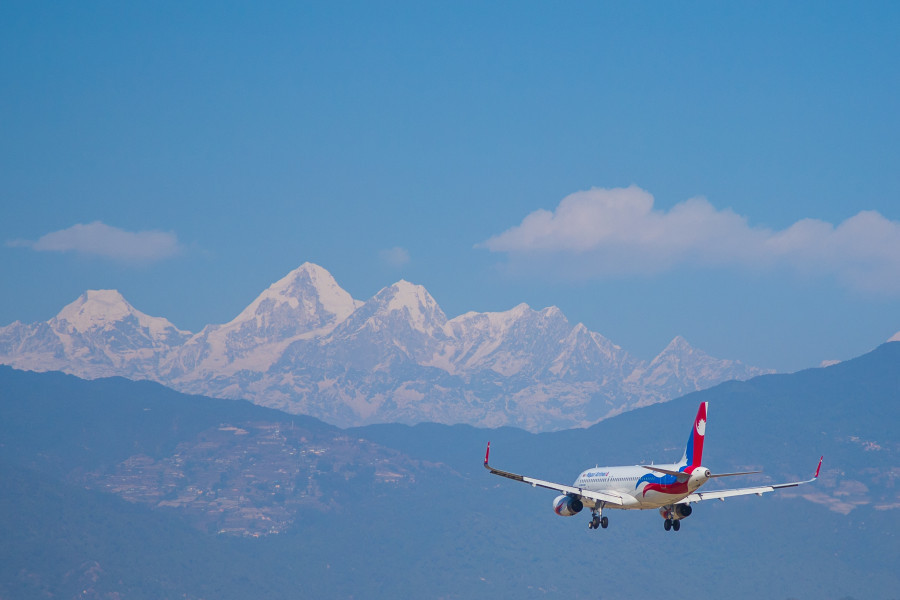
Nepal’s score in the UN aviation watchdog ICAO's air safety oversight audit has improved, officials said on Monday.
The International Civil Aviation Organisation (ICAO) has awarded Nepal an effective implementation score of 70.1 percent in its latest safety audit, ranking the country above the global average of 67.2 percent, said Pradeep Adhikari, director general of the Civil Aviation Authority of Nepal, the country’s civil aviation regulator.
This is a provisional audit report of the UN aviation watchdog and so far Nepal’s aviation sector's “safety has been extremely good.”
“ICAO has given high safety ratings for the country. We are above the global average,” he added. “Our skies are safe. Our aviation infrastructure is good and on par with the international standards.”
But the civil aviation regulator failed to keep up with Nepal's Aviation Safety Plan 2018-22, which had committed to improve its rate of effective implementation of the critical elements of the safety oversight system to 75 percent by 2022.
The Universal Safety Oversight Audit Programme Continuous Monitoring Approach (USOAP CMA) focuses on a state's capability to provide safety oversight by assessing whether it has effectively and consistently implemented the critical elements of the safety oversight system. The last such assessment was done in 2009.
This year, a team of 10 auditors from the United Nations specialised agency audited Nepal’s aviation from April 13 for 10 days.
The outcome of the audit score is crucial for Nepal and its burgeoning tourism and aviation industry as it could impact the international expansion plans of investors.
The decennial full safety audit of Nepal’s aviation sector was to be conducted in 2019, but the government had asked to defer it by a year.
The reason for the postponement was to give the government time to complete institutional reforms: Splitting the Civil Aviation Authority of Nepal into two entities—a regulator and service provider.
As per international norms, the same entity cannot be both service provider and regulator–two roles the Civil Aviation Authority of Nepal has been performing currently by providing airport services and also overseeing compliance with aviation regulations.
Such dual functions lead to a conflict of interest, the European Commission has maintained.
ICAO had agreed to the request for the year-long deferment, and had planned to conduct a full safety audit of Nepal from May 10-20, 2020. Covid-19 further pushed back the schedule. The ICAO team was expected to arrive for an audit on March 21, 2021, but due to the pandemic and consequent border closures, the plan was shelved once again.
Nepal’s effective implementation score was the result of an aggregate of individuals scores in eight key areas: legislation, organisation, personnel licensing, aircraft operations, airworthiness, accident and incident investigations, air navigation services, and aerodrome and ground aids.
Nepal performed poorly in three areas—legislation, organisation and accident, and incident investigations. The effective implementation scores of all these three key elements are below the global average.
According to a draft of the provisional audit seen by the Post, Nepal’s effective implementation score on legislation, or effective implementation of the State’s aviation security requirements, has come down to 76.19 percent from the earlier 90.48 percent.
But it is still above the global average, which is 76.16 percent, according to the ICAO’s interactive data.
Similarly, Nepal performed poorly on organisation, which defines organisational structure needed to meet safety standards. The effective implementation score on organisation has been reduced to 45.45 percent from the earlier 50 percent. The global average is 71.2 percent.
“The poor performance of these two indicators were the result of Nepal not promptly acting to pass two crucial civil aviation bills from parliament,” said a top civil aviation official who wished to remain anonymous.
Two crucial bills to unbundle the civil aviation body into regulator and service provider have been gathering dust for a long time, hampering Nepal’s effort to ensure a full aviation safety system.
The worst performer in the audit was the Civil Aviation Ministry, according to officials.
Out of the eight critical elements, accident and incident investigation is the responsibility of the Civil Aviation Ministry, which is responsible for monitoring developments in accident investigation techniques and practices as well as accident prevention matters.
Nepal's effective implementation score on accident and incident investigation was just 21.69 percent, slightly above 15.49 percent earlier—but very much below the global average of 57.08 percent.
“We admit that the response on the accident and incident investigation indicator is very poor,” said an official at the ministry. “The audit team has pointed out the need for proper training for investigators, and the need for the latest investigation kits.”
Nepal has been investigating incidents and accidents by forming a commission mostly headed by former directors general and secretaries at the Tourism Ministry. The audit has pointed out that investigation requires “trained manpower.”
“But we are making efforts from our side,” said the ministry official. “We have prepared investigation guidelines and have sent them to the Law Ministry for its consent. Once it gives a go-ahead, the guidelines will be tabled at the Cabinet for approval.”
“We have planned to pass the legislation by June,” said the official.
During the last audit on May 14, 2009, ICAO gave Nepal a score of 46 percent in the effective implementation of critical elements of the safety oversight system, which was way below the global average of 60 percent.
In July 2013, an ICAO mission visited Nepal to validate the corrective measures taken by the country to address the deficiencies pointed out by the global aviation watchdog in 2009.
It detected several lapses during an on-site audit held from July 10-16, 2013, and ICAO gave a “significant safety concern” tag to Nepal’s aviation sector in its audit report in August 2013.
The Montréal-based agency raised the red flag on operations among the eight critical elements of safety oversight due to a sharp rise in the number of air accidents and incidents between 2009 and 2012.
In July 2017, the ICAO-coordinated validation mission gave Nepal a score of 66.76 percent for effective implementation of safety standards—which is above the benchmark of 60 percent set by ICAO through its Global Aviation Safety Plan.
That same year, ICAO withdrew the significant safety concern tag given to Nepal’s aviation sector.













